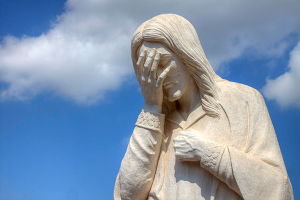Judaism began its development more than a thousand years before Christianity, and makes no demand that others convert or accede to its dominion.
 Rome, March 24 – Two of the world’s major faiths, accounting for billions of human beings and thousands of years of tradition, face difficulty with the developments of recent history and current events, developments that appear to dovetail with predictions made in Scripture that both faiths have long insisted their own texts replaced or repudiated, indicating that the faith they purported to replace remains valid and relevant, and that cast an even darker moral shadow on the persecution of adherents of that older faith by adherents of the newer ones.
Rome, March 24 – Two of the world’s major faiths, accounting for billions of human beings and thousands of years of tradition, face difficulty with the developments of recent history and current events, developments that appear to dovetail with predictions made in Scripture that both faiths have long insisted their own texts replaced or repudiated, indicating that the faith they purported to replace remains valid and relevant, and that cast an even darker moral shadow on the persecution of adherents of that older faith by adherents of the newer ones.
Christianity has long claimed to supplant Judaism as the revealed word of God, beginning about two thousand years ago, and grew to demand a rejection of Judaism, a demand that often devolved into abuse, killing, and expulsion of Jews who refused to comply. Islam made similar claims beginning several hundred years later, contending that both the Jews and the Christians possessed a corrupt tradition and that the true message for all of humanity lay in the teachings revealed to Muhammad; similar persecutions of both Jews and Christians under Islamic rule followed, continuing to this day. Judaism began its development more than a thousand years before Christianity, and makes no demand that others convert or accede to its dominion. Its canonical texts and teachings also foretell both the scattering and ingathering of Jews all over the world, with special treatment of renewed Jewish security and sovereignty in the land that birthed Jewish culture – visions that have begun to come to striking fruition over the last hundred-forty years, and which, if confirmed, could undermine the positions of the later movements that they represent the True Faith.
Prophets including major figures such as Isaiah, Jeremiah, and Ezekiel, as well as less-prominent seers such as Amos and Zachariah, spoke of intense subjugation and persecution of the people of Israel, followed by, in those prophets’ distant future, a redemptive process through which God will restore His people to the land of Israel, reestablish their self-governance, and have them shielded from the worst ravages of the exile. Some scholars even note the opening vision of Isaiah’s work – which takes place in the eighth century BCE – echoing the prophetic poem toward the end of Deuteronomy, which antedates Isaiah by centuries, thus pushing the prophecy even further into antiquity. Christianity and Islam, say experts, must therefor either modify their doctrine to accommodate the erroneous assertion that God rejected the Jews, or continue their age-old ignorance of textual and logical evidence that refutes the assumptions undergirding their theology.
Please support our work through Patreon.



